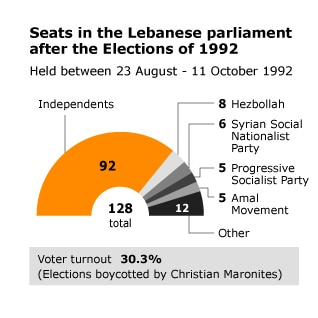One expert has called Hezbollah “the most powerful single political movement in Lebanon,” and Nasrallah stated in July 2013, “A government without Hezbollah will never be formed.” This statement and the fact that Hezbollah fields the strongest, best-trained, best-equipped military in Lebanon (because of Iranian support) mean it will continue to play an integral role […]
According to Lebanon’s 1943 National Pact designed to balance out the country’s different religious groups, the Prime Minister must be Sunni, the President must be a Maronite Christian, and the Speaker of Parliament must be Shiite.
Although Hezbollah wants to create an Islamic state through the use of terror tactics, by getting involved in the democratic process it has been forced to accommodate religious plurality, at least for the time being. Acting as a political party, it has members that run in elections and win seats in Parliament.
Hezbollah started becoming more involved in politics after the Lebanese Civil War ended in 1990, eventually forming an actual political party in Lebanon.
After some debate, the group decided to run for parliamentary elections in 1992, which Supreme Leader of Iran Ayatollah Ali Khamenei endorsed, and won all 12 seats on its electoral list. Hezbollah won 8 out of 128 parliamentary seats and maintained a strong political entity in elections throughout the 1990s.

Under the May 2008 Doha Agreement, Hezbollah was effectively granted veto power in Lebanon’s cabinet following a political crisis where the group took control of West Beirut. It then went on to win ten parliamentary seats in 2009, the same year that Nasrallah updated Hezbollah’s manifesto, which did not renounce the group’s militant goals laid out in 1985 but did acknowledge they would take time and that “a more contemporary Islamist nationalist approach” is needed to accommodate political realities. Regarding Israel, however, Nasrallah made clear that the group would not tolerate any compromise on its position that the Jewish state must be destroyed.
Since 2009, Hezbollah has collapsed two Lebanese governments, indicating its domestic influence. The group’s efforts in the Syrian Civil War to help Assad, however, are causing some resentment. Sunnis fighting in Syria are threatening Beirut and southern Lebanon while some rivals in the Lebanese government are furious at Hezbollah’s support for Assad. People in the region are wondering if Hezbollah is a Lebanese organization looking out for the citizenry’s best interests or a group promoting Shiite goals in the region on behalf of Iran. What happens in Syria could greatly affect Hezbollah’s base of support, even among Shiites.
Qassem Suleimani is the commander of Quds Force, the elite faction of Iran’s Revolutionary Guards, is a veteran of decades…
Iran has long influenced the Middle East through the deployment of short ranged rockets and rocket artillery. They represent an…